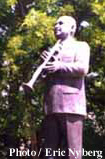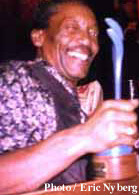
Beale Street in Memphis, Tenn., is the "Home of the Blues," where W.C. Handy developed the blues music style. The 20th Annual Handy Awards Ceremony and Festival brought me to Beale Street this year to soak up as much of the blues as possible — not only the music, but the people who make the music.
Arriving in Memphis a day before De Lay, I agreed to serve as his "on-site manager." I took care of a few logistical things, but more importantly, this allowed me to gain access to the backstage area during the awards and to attend other VIP events throughout the weekend. It was an experience of a lifetime. There are certainly many tales to tell: about meeting musicians I had listened to for years, hearing bands play in more than 20 clubs along a three-block stretch of Beale Street, discussing issues of black-and-white, and also how the blues are often viewed as a second-rate genre in the music industry. The most memorable experience was having breakfast with the four-time Handy Award winner, Willie "Big-Eyes" Smith, Muddy Waters' drummer for 19 years, from 1961 until 1980. We met at a pre-award reception, and he agreed to breakfast and an interview the following day.
Smith was born in Helena, Ark., in 1936. "I wasn't born yesterday, but maybe a day or two before that," he says. At 63, Smith is still working hard, touring with his Legendary Blues Band, and playing club gigs and festival dates throughout the country. But it hasn't always been easy. Back in the '50s and '60s there were times it was downright dangerous. For example, there was the time Muddy Waters, "Big Eyes" and the rest of the band played Birmingham 10 days after a series of race riots. The band was also the first black band to play Ole Miss. "Those kids were dancin' and drinkin' moonshine like they were in a juke joint," Smith says. "Big Eyes" started playing the blues at 17, when he visited friends and family in Chicago for a couple of weeks. Arriving on a Friday, he found a good paying day job by the following Tuesday. Smith was doing well enough to think he would stay until he saved money to buy a car and return home to Arkansas. He soon had that car, but he never moved back home. As the music scene picked up, "Big Eyes" considered playing the saxophone or piano, but those instruments cost too much money (even then). So he learned to play the harmonica. But when legendary harmonica player Little Walter arrived on the scene, "Big Eyes" began banging the drums.
"Big Eyes" showed his happiness at winning his fourth W.C. Handy Blues Award. "It's Great!" he said. "It helps (my career) a lot to win." Smith's first Handy Award, in 1995, is the most meaningful to him, though. After that he knew he had made it to the top. "Big Eyes" agrees with the perception that drummers are often overlooked. "The drummer is normally not out in front as the leader of the band," he says. "The people know he is there, pushin' the band, but they don't really appreciate the importance of the drummer, and the bass for that matter. They are the keys, but there is just something magical about the guitar that captivates the audience." How did he get the nickname "Big Eyes?"
Smith continues to play as much as he can. He gets uncomfortable if he doesn't play for a few days. He still plays with old friends Pinetop Perkins, Fuzz Jones, Carey Bell and others. In addition to his own prowess, he has passed his talents to his son, Kenny "Beady Eyes" Smith. "Beady Eyes" can be heard keeping the beat on Paul De Lay's latest release, "De Lay Does Chicago." "Big Eyes" Smith has given a lot to the music and the fans, keeping the blues beat for nearly four decades. He has given me a greater feel for the heart behind the beat.  [Eric Nyberg is the co-organizer of the UnTapped Blues and Brews Festival in his hometown of Kennewick, Wa., and the owner of UnTapped Promotions LLC, which promotes the Blues music industry.]. Back to Contents
Copyright © The Southerner 1999.  |












